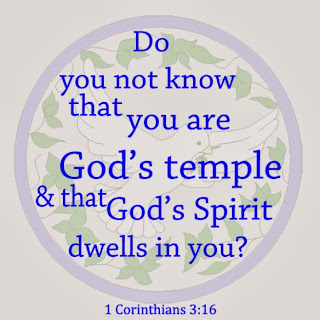A couple of days ago, at our Virginia Baptist state convention, I went to a breakout session that was led by members of the Epiphany Institute of Spirituality, a group of Baptists who are seeking to go deeper with God by reclaiming some ancient contemplative traditions. They led us in a time of contemplative prayer and worship, followed by a Q&A session about contemplative Christianity.
One lady had a hard time grasping how you could have an entire worship service without a sermon. Her died-in-the-wool Baptist roots had a difficult time thinking outside the box that she'd been raised in. She just couldn't get it. "What do you mean by contemplative?" she asked, more than once. Then, I think I saw a light bulb went off over her head when Michael Sciretti, one of our presenters, told her that the root word for "contemplate" and "contemplative" is "temple." So to contemplate is to go into the temple of your heart and meet one-on-one with God. 1 Corinthians 3:16 says that we are God's temple, so to meet with Him in contemplation is to go on an inner journey through the temple, into the Holy of Holies.
In today's scriptures, we read about Ezekiel measuring out a visionary temple, with all its many chambers. Jesus says in John 14:2-3 (ESV), "In my Father's house are many rooms. If it were not so, would I have told you that I go to prepare a place for you? And if I go and prepare a place for you, I will come again and will take you to myself, that where I am you may be also."
We have heard these words from John 14 in many funerals, when the preacher talks about Heaven. The beauty of contemplation is that we don't need to wait until we die to enter the Father's house. Just as God designed the temple in Jerusalem with apartments for priests to live in, so God desires for us to dwell in His inner temple, here and now. Living a contemplative lifestyle means making God's house, your home.
The Epiphany Institute of Spirituality's website states: "The Epiphany Institute of Spirituality (EIS) exists to reclaim and revive these early Baptist emphases within our own historical tradition through adapting teachings and practices of contemplative streams of Christianity from the Latin West, Greek East, and Syriac Orient." Workshop presenter Randy Ashcraft put it this way: "We are open to all traditions that point to Christ." Jesus said it like this: "In my Father's house are many rooms."
Authentic Christianity is open Christianity--a faith that is open to all traditions that point to Christ. I'm proud to call myself a Baptist--but I'm a Christian first. This means I've got to be open to all Christian traditions that lead to a deeper walk with Jesus. Limiting myself to Baptist expressions prevents my exposure to forms of Christian prayer, meditation, contemplation, and understanding of the Bible that might otherwise enrich my spiritual life.
Even within the Baptist tradition, most of us are unaware of the depth of contemplative thought that has been expressed through our rich history. Michael Sciretti has written a book entitled Entempling: Baptist Wisdom for Contemplative Prayer. In this book, Sciretti quotes many famous and less-than-famous Baptist preachers and authors, pointing to a stream of contemplation that has run through the centuries of Baptist thought and practice. Sciretti's work can be used both as aid to personal devotion, and as a tool for corporate contemplative worship. Of this book, musician Drexel Rayford (also an EIS presenter) says, "Dr. Sciretti has pulled together wisdom from a long ignored 'spring.' Anyone who drinks of this water will experience a unique sort of soul-thirst quenching. I highly recommend it!" C.S. Smith says, "The editors of this book are trusted spiritual directors of the highest order, both of whom have had positive impact on my life... So pleased that this book has come into being." Why not follow the link to Amazon and pick up a copy for yourself?
In John 14:1 (ESV), Jesus says, "Let not your hearts be troubled." The word "trouble," according to the Online Etymology Dictionary, comes from the Latin turbulare, from the Late Latin turbidare, "to make turbid." To let your heart be troubled is to allow it to become like water churned by a storm. Don't let your heart be turbid. Let it be the opposite of turbid. Instead, let it be like the stormy sea that was calmed when Jesus said, "Peace, be still." Let it be peaceful and still, like the sea of glass before God's throne (Revelation 4:6).
I pray that you'll find Jesus' peace in His temple--in contemplation. I pray that His temple, His Father's house with many rooms, will be a shelter for you. I pray that in that temple, you'll be at peace, that you'll be still, and that you'll know that God is God (Psalm 46:10).


No comments:
Post a Comment